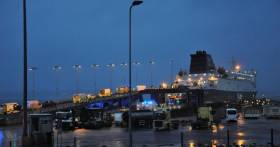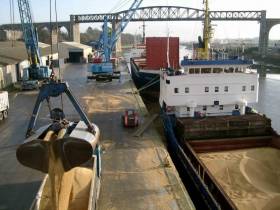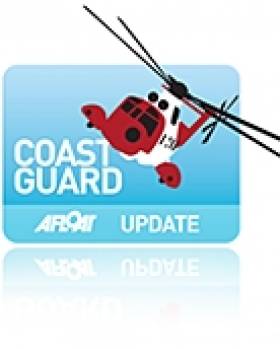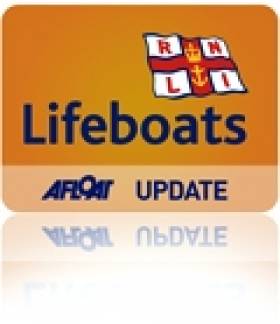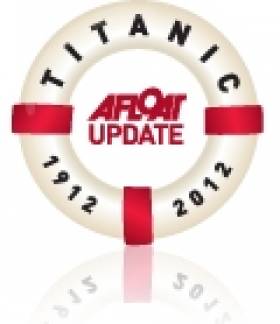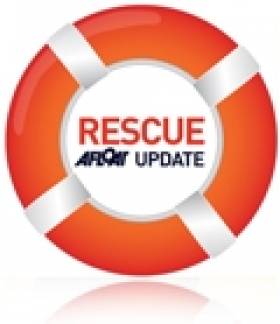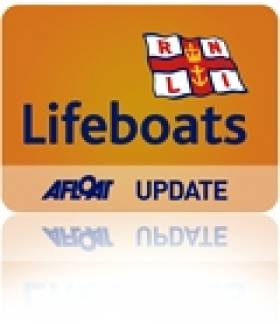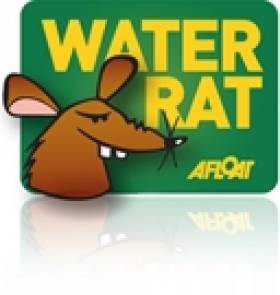Displaying items by tag: emergency
Overturned Lorries At Scottish Ferry Port Spark Major Emergency Response
#ferry - Several vehicles moved position in high winds causing damage to the ferry at Cairnryan Port in Scotland.
According to the Express & Star, lorries have overturned on a ferry sailing at Cairnryan in high winds, prompting a major emergency response.
Several ambulances were sent to the scene along with police, the fire and rescue service and the coastguard, after six vehicles shifted on board the ferry, causing damage.
No one is reported to have been injured in the incident, which happened at around 7.30am on Tuesday, but some passengers have been confined to their vehicles.
P&O Ferries said in a statement: “We can confirm that an incident took place on the European Causeway this morning.
“In extreme weather conditions, a number of vehicles have moved position on the decks causing damage onboard.
“All passengers and crew are safely accounted for, there are no reports of injuries and the emergency services are in attendance.”
To read more including a comment from the fire service, click here.
Major Emergency Exercise In Drogheda Port This Morning
#DroghedaPort - Drogheda Port was the base of a major emergency planning exercise this morning (Thursday 27 October) as Garda units and other emergency services simulated a three-stage hostage scenario, as The Irish Times reports.
In the first stage, the Garda Water Unit aided armed response officers in boarding a vessel detected acting suspiciously. This was followed by a hostage-taking simulation on the dock, concluding with an armed assault on a port warehouse to free the hostages.
The operation, which was expected to conclude by lunchtime, was focused on evaluating the emergency response capabilities of relevant units and personnel.
Castleconnell Boat Club Reacts to Shannon Incident
Castleconnell Boat Club has released a statement regarding the capsize on the Shannon:
Early this morning (Thursday 4th February) Castleconnell Boat Club was informed that a number of individuals had entered the club grounds at World’s End at approximately 4am. The club was only recently accessible after weeks of total flooding, and much of the surrounding area had been under water, or damaged. Four men removed one of the club safety launches, which was without an engine, and put it on the water.
With flooding still an issue the water was very high, and the water extremely fast. We have been told that the men got into difficulty very quickly, and we believe they capsized nearby. Early news reports say that that emergency services spent several hours rescuing them and that they are being treated in Limerick Hospital.
Safety is always the top of CCBC agenda and the thoughts of anyone on such dangerous water especially at that time of night, and without means to propel the boat is frightening in the extreme. No members have been permitted on the water for over two months, due to safety concerns.
The dangers of water cannot be over emphasised and we commend the bravery and the professionalism of the Coast Guard, and the Emergency Services.
Our thoughts and best wishes are with the individuals and their families at this terrible time.
Yours in rowing,
Francis Moloney
Club President CCBC
Water-Based Emergency Calls Will Go Directly To Coastguard
#Coastguard - All water-based emergency calls to 999 or 112 will be relayed directly to the Irish Coast Guard, as The Irish Times reports.
The new measure – first considered by then Transport Minister Leo Varadkar in July 2013 – comes in the wake of recommendations from the report on the Tit Bonhomme tragedy off West Cork in January 2012, which took the live of five fishermen.
It was found that two mobile phones were used to call for help when the trawler's VHF radio failed, but the calls were handled by two separate centres with no co-ordination between them, and relayed separately to the coastguard and Gardaí.
The Irish Times has much more on the story HERE.
Tit Bonhomme 999 Concerns Will Be Considered Says Varadkar
#TitBonhomme - Transport Minister Leo Varadkar says he will consider concerns over the handling of emergency calls relating to the Tit Bonhomme tragedy, as The Irish Times reports.
The minister commented after a meeting last week with the widow of the stricken boat's skipper Michael Hayes in Union Hall in West Cork.
Hayes and four of his five-man crew lost their lives when the trawler went down after striking rocks at the mouth of Glandore Harbour. The only survivor was Egyptian fisherman Abdelbaky Mohamed, who was able to swim to shore.
The recent inquest into the incident criticised the handling of 999 emergency calls from the fishing boat prior to its sinking, as it emerged that neither the Irish Coast Guard nor the Marine Casualty Investigation Board were aware that not one but two calls were made by crewman Kevin Kershaw.
It emerged during the inquest that the coastguard was only notified of the event on the second call, three minutes after the first.
Barrister Elizabeth O'Connel, who represented Hayes' widow Caitlín Uí Aodha at the inquest, described the dearth of details taken by the operator on the first call as "extraordinary".
Ireland's emergency call service, operated by BT Ireland from three locations, is currently under review by the Department of Communications.
The Irish Times has more on the story HERE.
Skerries RNLI Crew Shadows Ambulance Teams in Unique Learning Experience
#RNLI - Skerries RNLI volunteer crew recently undertook an exercise the likes of which they had not done before - shadowing a local ambulance team to observe how they respond to emergencies.
Philip Ferguson, a Skerries RNLI crew member, is also an advanced first responder with the local Dublin fire brigade. He has been on many sea rescues and call outs, and though not all have resulted in an ambulance being called to the scene, there are always those incidents that do require their specialist services.
In this regard, Ferguson believed that for the local lifeboat crew to witness how the ambulance teams operate would provide invaluable experience to the crews.
He approached Skerries RNLI lifeboat operations manager Niall McGrotty and divisional operations manager Owen Medland with his idea to discuss the possibility of some of the local RNLI crew joining the ambulance teams on some of their shifts in an observational capacity. They would not be allowed to take part or assist the HSE crew at any point, they were there to look and learn.
Both agreed that it was an exercise worth pursuing, and an arrangement was then made with the local HSE ambulance base in Swords. Over a period of three weeks, all of the RNLI crew took either a day or a night shift with the HSE ambulance crews. As the ambulance teams were called out, the RNLI volunteer rode along in the ambulance, observing the HSE teams at work be it at roadside after car crashes or to the homes to which they were called.
They witnessed first-hand the long hours and the dedication put in by the HSE ambulance teams as they waited in A&E at hospitals and transported their patients with care. Each individual who went on the exercise said it was, without doubt, an enlightening experience.
They also witnessed the professionalism of the HSE ambulance crews in sometimes very difficult circumstances. They saw how the ambulance crews worked with each other, their partners, and how they did their utmost to provide care and attention to the patient as they reviewed the situation, analysed the needs of the patient and did what was necessary to stabilise and transport that individual to hospitals. Each of the RNLI crew who went on the training came back with renewed and utmost respect for the ambulance crews.
The RNLI volunteer crew has not yet had to put their latest training to the test in 2013. However, with the knowledge they gained on the observational placements, they have added to their skills.
Such was the success of this exercise between that it is hoped it can be repeated. Skerries RNLI would like to thank each of the HSE ambulance crews for allowing them to spend time with them and learn.
Titanic Emergency as Ill Passenger Airlifted
#TITANIC - The Titanic memorial cruise was yesterday forced to turn back just 100 miles from the southwest coast of Ireland after a passenger fell ill, BBC News reports.
The Irish Coast Guard rescue helicopter at Shannon was dispached to the MS Balmoral to retrieve BBC cameraman Tim Rex, 56, who was struck by a non-life threatening heart condition, according to the Irish Independent.
Rex, who was covering the memorial sailing for the BBC, was treated by ship's doctors before being airlifted to hospital as a precaution.
The emergency happened just hours after the ship departed Cobh, the last port of call of the ill-fated Titanic before it sank in the North Atlantic on 14 April 1912.
A spokesperson for Titanic Memorial Cruises confirmed that despite the delay, the ship is still on schedule and is expected to arrive at the Titanic wreck site as planned on Saturday.
Scottish Search and Rescue Base UK's Busiest in 2011
#RESCUE - The Royal Navy search and rescue unit at HMS Gannet was the busiest in the UK last year, STV News reports.
The unit - based in Prestwick, near Glasgow - responded to nearly 300 call-outs and rescued 240 people in Scotland, northern England and Northern Ireland throughout 2011 with its fleet of Sea King helicopters.
The big numbers put HMS Gannet at the top of the UK's 12 search and rescue units for the fifth year running.
"Like all emergency services, we work under significant pressure and always aim to provide the best service we possibly can," said HMS Gannet's Lieutenant Commander Debdash Bhattacharya. "Frequently lives depend on it."
Since 2007 the unit has rescued 1,575 people from 1,865 call-outs in total. Last year's call-outs represented 17% of all call-outs from military bases in the UK.
STV News has much more on the story HERE.
Ballycotton Lifeboat Launched to Assist Ailing Fishing Vessel
#LIFEBOATS - Ballycotton's RNLI lifeboat was dispatched in poor conditions Wednesday evening to fishing boat taking on water some 20 miles south east of the Co Cork town, FishNewsEU.com reports.
Assisted by the Waterford coastguard helicopter Rescue 117, the lifeboat stood by the Irish-registered fishing vessel as its four-man crew kept the water intake under control and headed towards Ballycotton harbour under its own power.
Once returned to port, an RNLI salvage pump was placed aboard the boat to extract the excess water, and the crew offered thanks to the emergency services for their assistance.
While it might be an exaggeration to say that all of the 21 crew members of Rambler 100 owe their lives to the Irish Search and Rescue service, there are certainly five people whose future prospects were greatly improved by the operation off the Fastnet Rock on August 15th. A lot of media focus has been on Coxswain Kieran Cotter and the crew of Baltimore Lifeboat as well as lifeboat mechanic Jerry Smith, whose dive boat, on charter to the media team of one of the competitors, was on hand to search and recover the five drifting crew. There is no question that this focus is appropriate. RNLI crews all over the UK and Ireland deserve the attention, not only because of their extraordinary voluntary dedication to the cause, but also because such publicity helps swell the coffers of the charity. The service could not operate without the generosity of the donors and incidents such as these help fill the blue boat-shaped boxes held by even more RNLI volunteers.
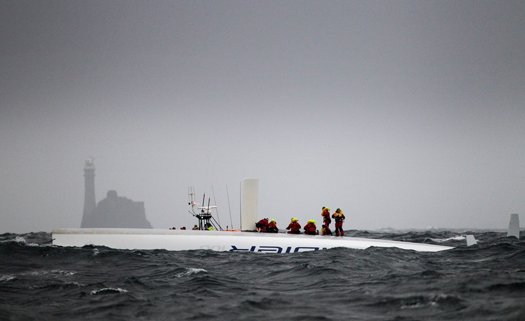
Saved: Ireland's Rescue Services Answered the Call of the capsized Supermaxi Rambler 100 off the Fastnet Rock. Photo: Team Phaedo
The dramatic stories and pictures dominating the media show the front line of a quite wonderful resource that is Search and Rescue in Ireland today. Baltimore Lifeboat was at the coal face of an intricate network of operations, triggered by the crew's EPIRBs. Irish Coast Guard radio officers in Valentia responded almost immediately tasking the rescue resources, working the phones and computers to confirm that this was not an accidentally triggered EPIRB, contacting RORC HQ, determining search patterns and relaying the information to the scene. It was the backroom contacts between RORC and the Coast Guard in endeavouring to contact Rambler 100 using satellite phones that confirmed the possibility of a catastrophic incident involving the Supermaxi. The subsequent tasking of the Shannon and Waterford based Sikorsky helicopters led to the medevac of crew member Wendy Touton and timely treatment of her hypothermic condition, initially by the on-board paramedics and later at Tralee General hospital. And Coast Guard involvement didn't end with the successful rescue – the shoreside operation to provide food and shelter in Baltimore was coordinated by Coast Guard personnel and the salvage operation of the hull of Rambler 100 was overseen by the Irish Coast Guard.
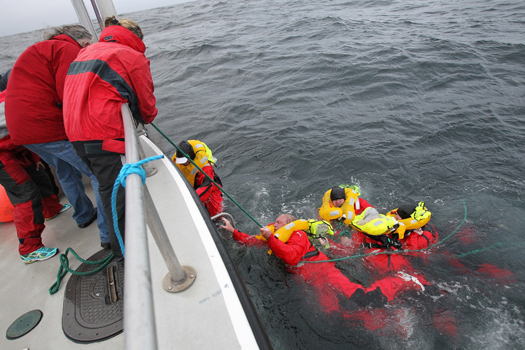
Rambler crew are recovered from the water after a SAR operation by the Irish Coastguard Photo: Team Phaedo. More photos here.
That Ireland has probably one of the best Search and Rescue services in the world goes back to the campaign initiated in 1988 by Joan McGinley, following the death, within sight of land of Donegal fisherman John Oglesby, whose leg was severed in a trawl winch. Eamon Doherty, the late former Garda Commissioner chaired the review group established in response to the campaign and his report led to the establishment of the Irish Marine Emergency Service, subsequently the Irish Coast Guard. Under the guidance of Director Capt Liam Kirwan, the new service moved quickly to become not only the central co-ordinating body for Search and Rescue, but developed its own resources, notably the helicopters, previously tasked in from Irish Air Corps and UK SAR.
Another element that will feature in the Rambler 100 incident is the Marine Casualty Investigation Board (MCIB), set up from recommendations arising from a review of the handling of investigations into marine casualties.
It might be thought that the incident is now closed, but there are many unanswered questions and the investigation will be looking at these and making recommendations that should improve safety in this sector. These questions will include EPIRB performance, liferaft deployment and grab bag usage, but perhaps the key issue yet to be determined is why the response from fellow competitors didn't appear to happen. Even if Channel 16 wasn't being actively monitored, and if not why not, shouldn't the Mayday set off by the Coast Guard have set off the DSC alerts on the radios of Rambler 100's fellow competitors? Had the incident occurred several hours later or earlier when Rambler 100 could have been up to 100 miles from the nearest land, when conditions worsened, we could be looking at much more serious consequences.
It is heartening to think that, in this small country of ours in troubled times, not only do we have a shining star in our search, rescue, recovery and restore system, involving professionals and volunteers cooperating for the greater good, we also have a system that determines the nature of incidents so that we can all learn from the experience.
And let us not forget those people and services, such as the Gardai, Navy, Army and the community of Baltimore who are outside the media spotlight who contributed to this happy ending.
Afloat's Latest Coastguard News
Afloat's Latest RNLI Lifeboat News
Afloat's Latest MCIB News



























